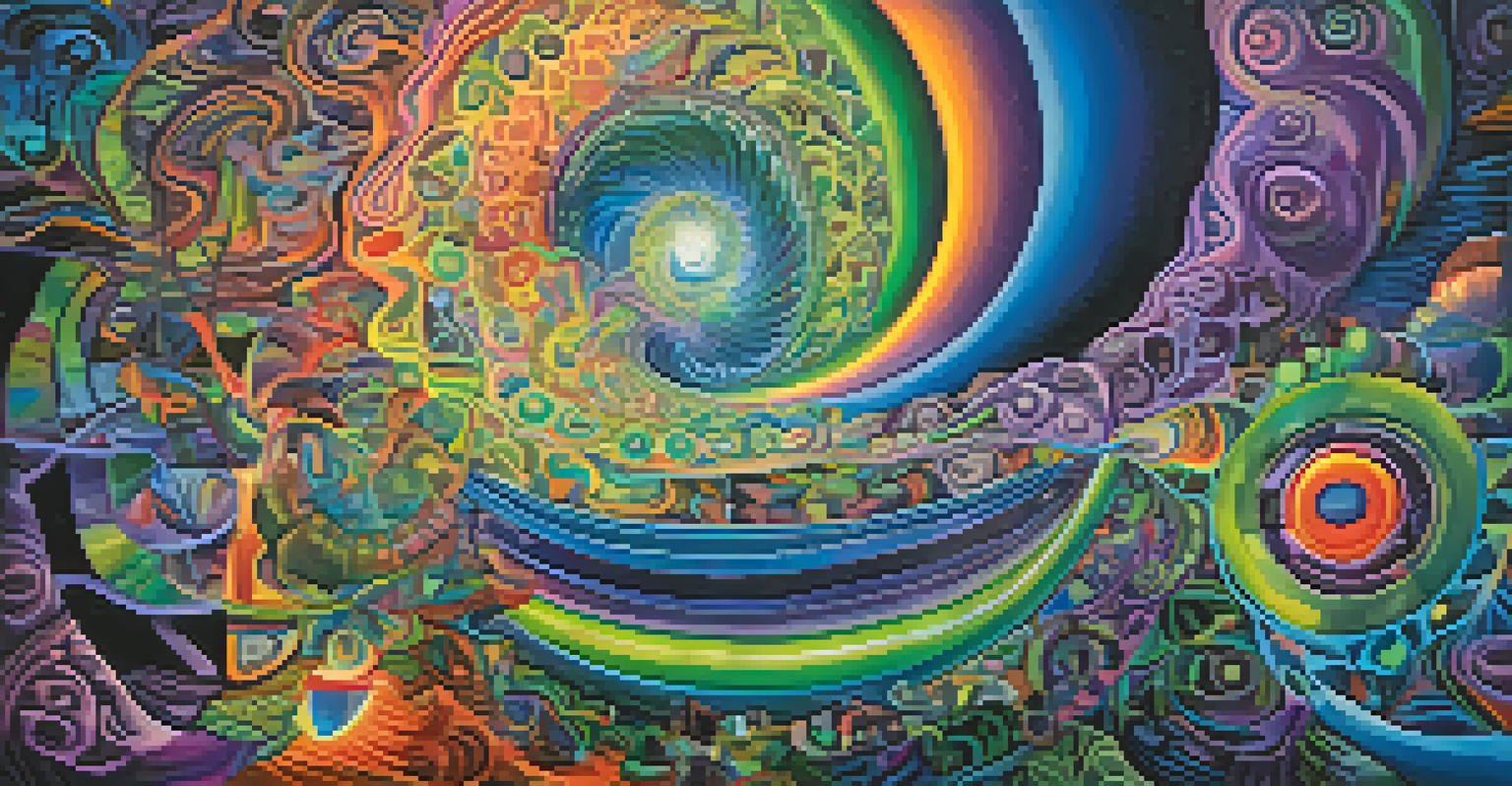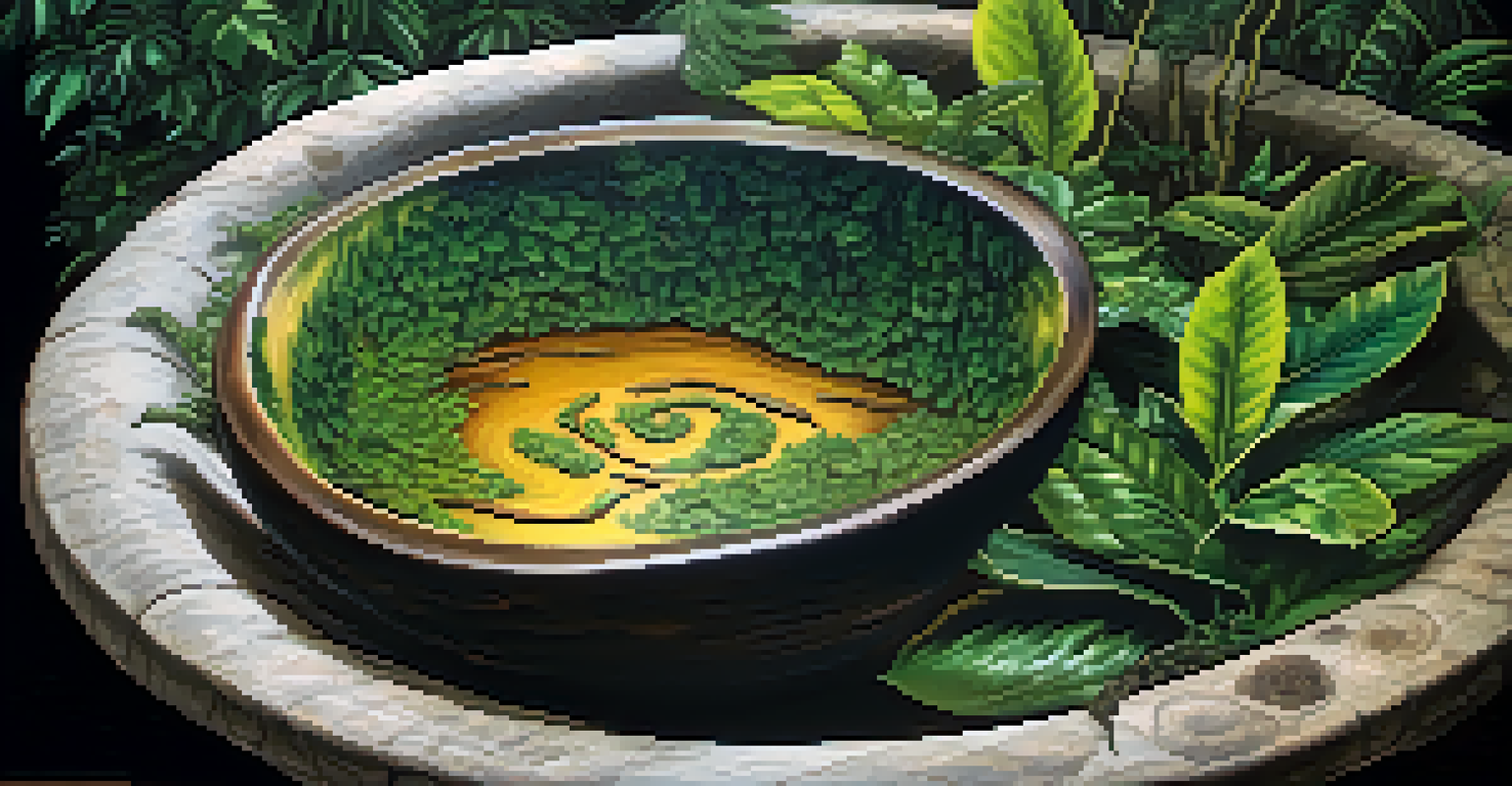The Science Behind Ayahuasca and Its Psychological Effects

What is Ayahuasca and Its Cultural Significance?
Ayahuasca is a traditional brew made from the Banisteriopsis caapi vine and other plants. Originating from the Amazon rainforest, it has been used for centuries by indigenous cultures for spiritual and healing purposes. This potent mixture is revered not just for its psychoactive properties but also for its role in rituals and community bonding.
The experience of ayahuasca is like a mirror that reflects the deepest parts of yourself.
The ceremony surrounding ayahuasca involves guided sessions led by experienced shamans. Participants often seek insights into their lives, healing from trauma, or a deeper connection to nature and spirituality. These ceremonies are more than just a drug experience; they are deeply rooted in cultural traditions and communal experiences.
In recent years, ayahuasca has gained popularity beyond indigenous communities, attracting individuals from around the globe. Many are drawn to its potential for personal transformation, making it a subject of increasing interest in both psychological and scientific fields.
The Active Compounds in Ayahuasca
The primary active compounds in ayahuasca are DMT (dimethyltryptamine) and MAOIs (monoamine oxidase inhibitors). DMT is a powerful psychedelic that can induce intense visual and emotional experiences. However, when taken alone, DMT is quickly broken down by the body, which is where MAOIs come into play.

MAOIs prevent the breakdown of DMT, allowing it to enter the bloodstream and reach the brain, producing the profound effects associated with ayahuasca. This unique combination is what differentiates ayahuasca from other psychedelic experiences, creating a longer-lasting and more introspective journey.
Ayahuasca's Cultural Importance
Ayahuasca is a traditional brew used by indigenous cultures for spiritual healing and community bonding.
Understanding these compounds sheds light on how ayahuasca can facilitate psychological breakthroughs, as they interact with serotonin receptors in the brain. This interaction can lead to altered states of consciousness, allowing individuals to confront and process deep-seated emotions.
The Psychological Effects of Ayahuasca Experiences
Ayahuasca can evoke a wide range of psychological effects, from intense emotional release to profound insights. Many users report experiencing a heightened sense of self-awareness and clarity regarding their life’s purpose. This can be particularly helpful for those grappling with mental health issues like anxiety or depression.
Psychedelics can provide a pathway to profound insights and healing, if approached with respect and care.
One of the most commonly reported effects is the ability to confront past traumas. Participants often describe reliving and processing painful memories, which can lead to catharsis and healing. The experience can feel both challenging and liberating, resembling a therapeutic deep dive into the psyche.
Furthermore, the communal aspect of ayahuasca ceremonies can enhance these psychological effects. Sharing experiences with others fosters a sense of connection and support, allowing for collective healing and understanding, which can be incredibly powerful.
Ayahuasca and Mental Health: Potential Benefits
There is growing interest in the potential therapeutic benefits of ayahuasca for mental health conditions. Preliminary research suggests it may alleviate symptoms of depression, PTSD, and addiction. The insights gained during ayahuasca experiences can empower individuals to make meaningful changes in their lives.
One study found that participants experienced significant reductions in depression and anxiety following ayahuasca ceremonies. This could be linked to the emotional processing and cognitive shifts that occur during the experience, helping individuals to reframe their perspectives.
Therapeutic Benefits of Ayahuasca
Research suggests ayahuasca may alleviate symptoms of mental health conditions, including depression and PTSD.
However, while these findings are promising, more rigorous scientific research is needed to understand the long-term benefits and risks. It’s important for individuals to approach ayahuasca with caution, ideally under professional guidance, especially if they have pre-existing mental health conditions.
The Risks and Considerations of Ayahuasca Use
While ayahuasca has potential benefits, it’s not without risks. Some individuals may experience overwhelming feelings of fear or anxiety during their journey, known as a 'bad trip.' This can be particularly challenging for those with a history of mental health issues or those unprepared for the intensity of the experience.
Physiologically, ayahuasca can interact with certain medications, especially those related to mental health. MAOIs can cause dangerous reactions when mixed with antidepressants or stimulants, which is why it’s crucial to disclose any medications to facilitators beforehand.
Additionally, the authenticity of the ayahuasca experience can vary widely. It's essential to choose reputable and safe environments for ceremonies, as the setting and guidance can significantly impact the experience and its outcomes.
Integration: Making Sense of the Ayahuasca Experience
Integration refers to the process of incorporating insights gained from ayahuasca experiences into daily life. After a ceremony, many participants feel a sense of clarity and inspiration, but the challenge lies in translating those feelings into actionable changes. This is where integration support comes into play.
Therapists and integration coaches often work with individuals to help them process their experiences and make sense of the insights they’ve gained. This could involve journaling, discussions, or specific practices that align with their newfound understanding.
Risks and Integration Challenges
While ayahuasca offers potential benefits, it also carries risks and requires careful integration of insights post-ceremony.
Without proper integration, the powerful revelations from ayahuasca can fade or become overwhelming. Engaging in this reflective process can help individuals to maintain the benefits and continue their personal growth journey long after the ceremony has ended.
The Future of Ayahuasca Research and Exploration
As interest in ayahuasca continues to grow, so does the potential for further research into its psychological effects and therapeutic uses. Scientists are beginning to explore how psychedelics can reshape our understanding of mental health and consciousness, and ayahuasca is at the forefront of this exploration.
Future studies may provide deeper insights into the mechanisms by which ayahuasca affects the brain and its long-term impacts on mental health. This could lead to more informed approaches to using ayahuasca as a therapeutic tool.

However, with this growing interest, it is crucial to approach ayahuasca with respect and understanding of its cultural roots. Ethical considerations in research and practice will ensure that the benefits of ayahuasca can be shared responsibly and meaningfully.